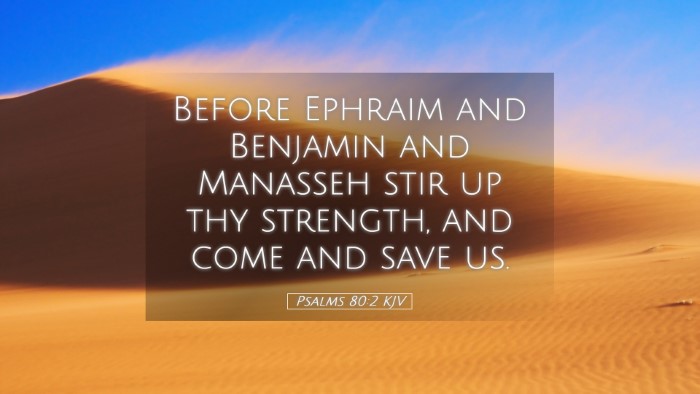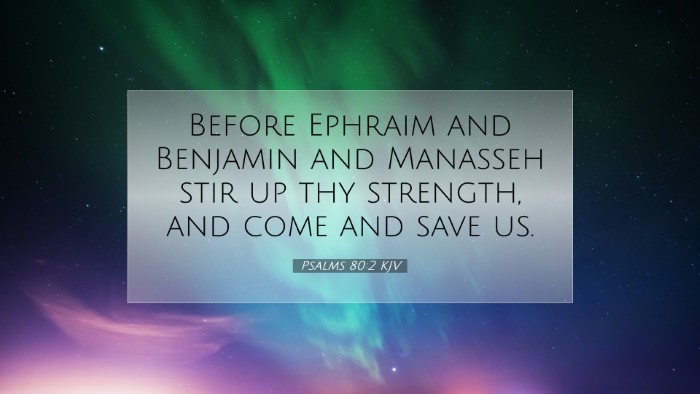Psalms 80:2 - A Commentary
“Before Ephraim and Benjamin and Manasseh, stir up thy strength, and come and save us.”
Context and Overview
This verse is part of a larger psalm attributed to Asaph, which is a plea for restoration and salvation. The psalm reflects a deep concern for the nation of Israel and its perilous state. It opens with the recognition of God’s previous guidance and strength, and highlights the Israelites' need for divine intervention.
Insights from Matthew Henry
Matthew Henry emphasizes the corporate nature of the prayer. He points out that the Psalmist identifies the tribes of Ephraim, Benjamin, and Manasseh, which were key figures of the northern kingdom of Israel. Henry explains that the mention of these tribes is not merely geographical but signifies the unity and collective distress of Israel. He notes the urgency of their petition for God to “stir up Thy strength” as a call for divine intervention in their dire circumstances.
Henry further elaborates on the historical implications, suggesting that this psalm might have been composed during a time of oppression or foreign invasion, reflecting the physical and spiritual desolation of the people. He draws a parallel between Israel's plight and the need for modern believers to seek God’s power in their own struggles.
Insights from Albert Barnes
Albert Barnes provides a detailed exegesis of the text. He interprets the phrase “stir up thy strength” as an appeal for God to manifest His power actively. Barnes suggests that the verse embodies a deep theological understanding that acknowledges human weakness and the necessity for divine strength in times of trouble.
He notes that mentioning Ephraim, Benjamin, and Manasseh signifies inclusivity and recognition of the whole nation. This inclusion highlights the communal identity of God's people and their recognition of needing salvation. Barnes also connects this plea to the broader biblical narrative where God has repeatedly saved His people from dire situations, encouraging readers to have faith in God’s ability to intervene.
Insights from Adam Clarke
Adam Clarke offers a historical and linguistic analysis of the verse. He points out that Asaph’s reference to these particular tribes is significant because Ephraim represents the leading tribe of Israel, while Benjamin represents the tribe that encompassed Jerusalem. Clarke contextualizes this within the framework of Israel’s history, noting that these tribes were central to both the military and spiritual life of the nation.
Clarke elaborates on the invocation of God’s strength, explaining that it ties back to the revelations of divine might seen in previous acts of deliverance. He draws attention to the notion that the psalmist is not merely requesting assistance but is urging God to display His strength in a powerful and definitive manner.
Theological Reflections
Psalms 80:2 serves as a potent reminder of the relationship between the believer and God. It underscores the idea that in moments of collective distress, the faithful are called to cry out to God for help. The verse illustrates a communal aspect to faith, where the needs of the community are brought before God.
- Dependence on God: The appeal for God to "stir up" His strength signifies an understanding of human limitations and a deep reliance on divine support.
- The Nature of Salvation: This verse encapsulates a theology of salvation that understands it as an active work of God rather than a passive waiting for intervention.
- Unity Among the Believers: By mentioning specific tribes, the Psalmist shows the importance of unity in prayer and seeking restoration. It reflects the belief that God’s people are stronger together, united in prayer.
Application for Today
This verse resonates with contemporary readers, particularly pastors and theologians, who are often called to lead congregations through times of difficulty. The verse can inspire messages about the importance of seeking God collectively and recognizing His strength in every situation.
- Encouragement in Prayer: Believers today are encouraged to bring their petitions before God with expectation, much like the psalmist.
- Recognizing Need for Divine Intervention: This verse encourages an acknowledgment of vulnerability and the absolute need for God in every aspect of life.
- Community and Collective Worship: The recognition of the tribes illustrates the necessity of unity in worship and prayer, reminding congregants that they are in this together.
Conclusion
Psalms 80:2 powerfully encapsulates a prayer for divine action and salvation. Drawing insights from various public domain commentaries enhances our understanding of this text, presenting it as both a historical plea and a timeless reminder of the need for God’s active presence. As believers reflect on this verse, they are called to remember God’s past acts of strength and to trust in His ability to save in their present circumstances.


